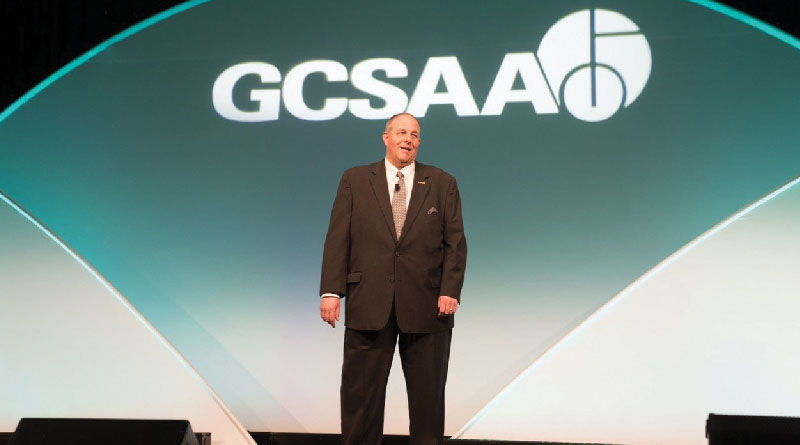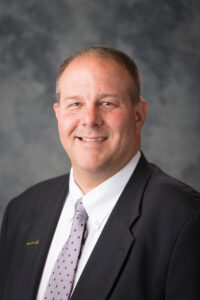Interview with John Fulling, Jr., President of the Golf Course Superintendent’s Association


John R. Fulling, CGCS President- Golf Course Superintendent’s Association of America & The Environmental Institute for Golf
What a way to open his presidency: with an international crisis shuttering businesses, citizens across America under several versions of “shelter in place” orders, and everyone fearful of an insidious invisible enemy. Worse still for the golf industry – only recently recovered from an earlier economic crisis – the shutdown comes during a critical transitional period for course maintenance, jeopardizing both courses and employees.
Happily, new Golf Course Superintendents Association of America President John Fulling, Jr. and the rest of the GCSAA have mobilized quickly, effectively turning their website into a clearing house for all Coronavirus-related issues facing the Association’s members, (https://www.gcsaa.org/resources/covid-19-pandemic-resources), and hosting weekly public webinars where the news of the week is discussed and action plans are implemented and reported on. Whether it’s the CARES Act’s benefits to residential mortgagors to various unemployment benefits for people displaced from work to a running tab on whether golf is allowed in each of the 50 states and the efforts to keep them open and ensure safe play and maintenance, the GSCAA has been a one-stop shop for up-to the minute information. President Fulling was gracious enough to take the time to brief us all of the Association’s endeavors.
GCT: What are he most common questions you hear from your constituents right now?


John R. Fulling, CGCS President- Golf Course Superintendent’s Association of America & The Environmental Institute for Golf
J. FULLING: Because we jumped out in front of this thing, there aren’t a lot of questions regarding the ability to maintain a course the way we want to maintain it, because long ago we worked to produce minimal baseline maintenance protocols. These protocols are set up regionally, and that allows each region to be specially tailored for their own weather systems, seasons, native vegetation, and other factors. For example, we worked with the Michigan State University turf team to create a schedule of maintenance that can be taken to legislatures an governor’s office for lobbying purposes, so we can show them we are not a risk for spreading Covid19.
What we’ve also tried to do is anticipate the problems they might have and provide all the information we can for them to maximize the best response for their situation no matter where they are in the country. We knew that we’d get different inquiries from different geographical areas, so we have set up the website to be able to provide general advice on some topics (such as employment benefits) and specifically tailored-advice on others (such as maintenance practices). We also have been constantly updating the webinars we provide on the website.
Most importantly, we are staying out in front so we can help everyone in our membership remain calm and optimistic. It was in 1926, when we were started as an association that our founder, Colonel John Morely said in his opening address that we were founded on the principles of justice, faithful brotherhood, and generous benevolence. Our purpose is to mold human character to make men rightly appreciate and esteem one another. It was true back then, it’s still true now, and it’s that sprit in which we are responding to this crisis. And that’s how we’re going to beat it.
GCT: We see that you’re also holding briefings every week.
J. FULLING: We host a weekly town hall on our website every Monday afternoon at 2pm EST. You can just go to our website, https://www.gcsaa.org/, and follow the link right at the top of the home page. One week we covered the CARES Act, issues involving unemployment benefits, HR issues, safety, and advocacy efforts. The next week we discussed Class A and CGCS renewal and disaster relief funds, as well as updated everyone on the topics discussed the week prior. And another week we had a roundtable of industry CEOs including Seth Waugh of the PGA of America. We’re galvanizing the entire golf industry in the face of this crisis.
GCT: And of course you’re tracking where golf and maintenance are allowed and where they are prohibited?
J. FULLING: We are tracking the whole country and set up a state-by-state spreadsheet showing where everyone is, the latest updates: whether we have a complete shutdown of golf, where maintenance is allowed, what the executive orders are, clarifications…everything.
GCT: It’s been a chaotic checkerboard, with one state saying one thing and the next state over saying just the opposite…
J. FULLING: It’s all over the board. In one state, golf is not allowed and neither is maintenance, which is really bad. Worse still, there is further confusion between states that are preemptive on the one hand, and states that give the individual counties the jurisdiction. Here in Michigan, the governor closed courses to play, but left ability to maintain it to the discretion of the counties. There is confusion and we now have to get clarification from the state and the local jurisdiction.
But the state-by-state clearing house we set up helps our chapters to understand what they are supposed to do. We are concerned with health and safety first, of course, and then protecting the asset – making sure the courses are able to be maintained so that when this does pass, the courses can be opened and in good condition.
GCT: It seems that several governments are easing restrictions and using your own GCSAA and WE ARE GOLF press materials as a starting point for broadening the re-opening of the game? What advocacy efforts are underway and how happy are you with their effectiveness?
J. FULLING: We are thrilled. The advocacy team is working round the clock both at the federal and state level and coordinating with field staff and all chapters. All the guidelines being used were put together specifically to address to this problem.
GCT: What feedback are you getting thus far from your constituents regarding maintenance, retaining workers, and keeping equipment and supply lines running?
J. FULLING: It’s too early to tell right now on some of the issues that may take weeks or longer to resolve, but regarding maintenance and reopening, almost everyone in the country is on the minimum maintenance protocol. They are reducing employees’ contact with each other, splitting shifts, sanitizing buildings and equipment, and making sure the course facility is safe for players and employees.
Everyone knows what they will do to open, but we won’t know the full story of the full impact for some time. Private courses may be better buffered than public courses. In Michigan, for example, public courses are pretty much closed, but just in the last few days the government said, “Well it’s their private property, and we can’t tell them they can’t walk around their private property.”
Finally, GCSAA has created an online too kit to help everyone see what the new rules and guidelines are for sanitation and social distancing. It also breaks down the 3-phase national re-opening plan as it is applicable to the golf industry, including all best management practices within the Federal guidelines. It also outlines our role in advocacy efforts within the industry that has been effective in educating lawmakers and promoting golf to them. By partnering with the World Golf Foundation, we had these protocols endorsed by medical professionals. This outreach helps all our members and their clubs.
Watching our staff behind the scenes is extraordinary; they’ve really been killing it: working hard long hours, and being diligent and thorough. We are really proud of their results and the alliance that formed. The communication is strong and everyone has come together. The altruism that golfers show each other on the course is manifesting itself off the course as well, and that what makes our game so great – the camaraderie of the people who play it.
[Author’s Note: We will speak with President Fulling again next month for an update on all these initiatives.]
When not reporting live from major sports championships or researching golf courses for design, value and excitement, multiple award-winning sports writer Jay Flemma is an entertainment, Internet, trademark, and banking lawyer from New York. His clients have been nominated for Grammy and Emmy awards, won a Sundance Film Festival Best Director award, performed on stage and screen, and designed pop art for museums and collectors. Twitter @JayGolfUSA
Recent Posts
South Carolina State Leaders Honor Green’s Superintendent Career
South Carolina’s House of Representatives today honored the career of golf course superintendent Chuck Green.…
Branson, Missouri: 5 Reasons Why it is a Must-Visit Travel and Golf Destination
Branson, Missouri, is booming as a must-visit destination for golf enthusiasts and travelers alike. Nestled…
Preview more than 1,000 rounds of golf available in GCSAA’s Rounds 4 Research online auction
The Golf Course Superintendents Association of America (GCSAA) Rounds 4 Research program offers golfers the…
EcoBunker Synthetic Revetting More Sustainable than Natural Turf*
*A recent report by the Welsh government has found that EcoBunker synthetically revetted bunkers have…
SiteOne® Hires Dan Carrothers as VP, Agronomic Business Development
SiteOne® Landscape Supply is pleased to announce Dan Carrothers as the new Vice President for…
Superintendents Online Turf Directory – EVERYTHING TURF
Our online directory, directory.GolfCourseTrades.com is the go-to resource for the busy superintendent. It is your opportunity…


